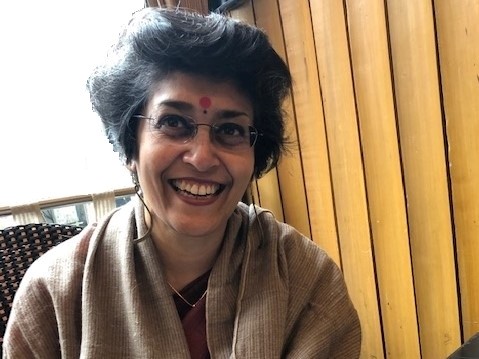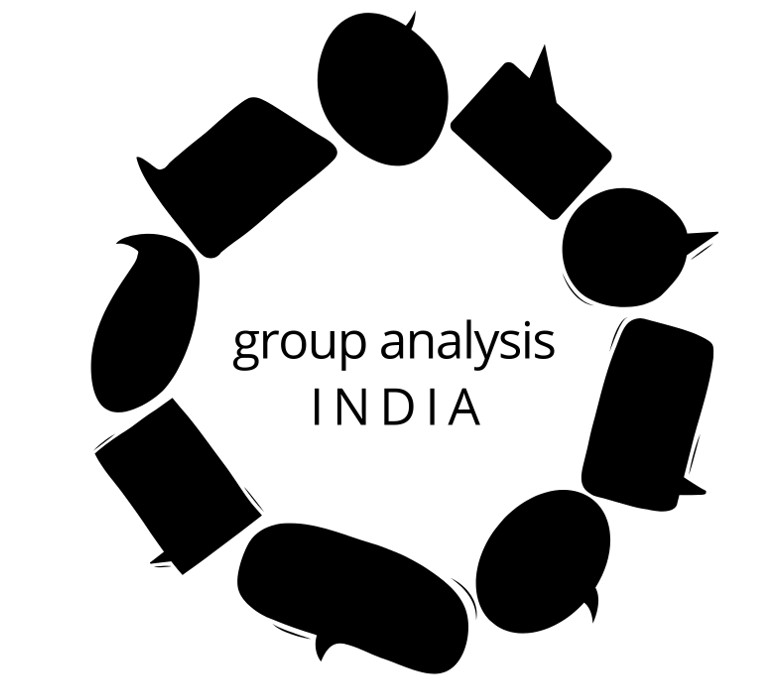The group analtic psychotherapy training in Bengaluru, India, is sustained through fees and donations.
All monies raised through these lectures are treated as donations and handed over to the registered charity, 'Group Analysis India' (Charity Number: 1192636)
All monies raised through these lectures are treated as donations and handed over to the registered charity, 'Group Analysis India' (Charity Number: 1192636)
Fund Raising
We are only able to sustain the group analytic training programme in India, through fund raising here in the UK for several reasons.
First and foremost, the fees being charged to the Indian candidates, which although considerable from an Indian perspective, are unable to meet the costs of the programme.
Second, even if we were able to raise sufficient money in India through whatever means, the Indian Government prohibits the payment of foreign professionals, particularly by charities like HNI (the institution that is hosting our training in Bengaluru).
It is for this reason that we have to raise funds outside of India.
To this end we have started the charity Group Analysis India (Charity Number 1192636) , the function of which is to raise funds to pay the costs of teachers, supervisors and group therapists.
Many colleagues and well wishers have supported us through one-off or regular monthly donations - for which we are very grateful. However, there continues to be a considerable shortfall.
This event, and others like it, are in the service of this end.
Further details of the training can be found here
www.groupanalysisindia.com
If you would like to make further one-off or regular donations, please visit our website or contact us.
We are only able to sustain the group analytic training programme in India, through fund raising here in the UK for several reasons.
First and foremost, the fees being charged to the Indian candidates, which although considerable from an Indian perspective, are unable to meet the costs of the programme.
Second, even if we were able to raise sufficient money in India through whatever means, the Indian Government prohibits the payment of foreign professionals, particularly by charities like HNI (the institution that is hosting our training in Bengaluru).
It is for this reason that we have to raise funds outside of India.
To this end we have started the charity Group Analysis India (Charity Number 1192636) , the function of which is to raise funds to pay the costs of teachers, supervisors and group therapists.
Many colleagues and well wishers have supported us through one-off or regular monthly donations - for which we are very grateful. However, there continues to be a considerable shortfall.
This event, and others like it, are in the service of this end.
Further details of the training can be found here
www.groupanalysisindia.com
If you would like to make further one-off or regular donations, please visit our website or contact us.

Jhuma Basak
Cultural invocation of maternal-fusion in males – India
Fund Raising Zoom Lectures
Cultural invocation of maternal-fusion in males – India
The post-Freudian era brought about a significant shift in the cultural positioning of the Oedipus complex that opened up a vast new psychoanalytic discourse from the East with their own theoretical conjectures on primal and oedipal developments. Girindrasekhar Bose (the ‘father of psychoanalysis’ in India), as early as 1949 stated that the ‘Oedipus complex offered the child two possibilities of satisfaction, an active and a passive one’ (Bose, 1949, p. 225) – opening up the locus of a psychoanalytic argument on bisexuality in the Indian cultural context. Further, its related employment around the Oedipus complex situated in a different cultural framework, explaining its varied impact in object relations impacting the intersubjective development of sexualities.
Decades later, in view of the application of the Oedipus complex in the East, the eminent psychoanalyst from India, Sudhir Kakar said ‘The Oedipus complex, in one variation or another, may well be universal, but it is not equally hegemonic across cultures’ (Kakar, 2005, p. 84). And to arrive at this conjecture Kakar explored deeper into the ‘maternal-feminine’ embedded in the dominant Hindu cultural mythology and fantasies in the conceptualisation of the Devi imago – ‘One of the more dominant narratives of this culture is that of Devi, the great goddess …’ (p. 78). Thus, the all-encompassing phallic goddess-mother Maa Durga with her ten hands and weapons – a community imagination – becomes the compelling magical artistry of every Indian Hindu household and male fancy. The popular dominant imagination of a divine maternal that equally nurtures and protects found its manifestation in the mythological creation of a warrior goddess in Maa Durga (a combined semblance of the protective phallic mother yet the bountiful, (for)giving mother with ten hands).
Some of the key concerns of this paper are:
• The transformation of the universal oedipal schema in a non-western maternal cultural context, as in India.
• How a patriarchal symbolic order prompts the imagination of a ‘phallic mother’.
• The intersection of psychoanalysis, culture, and patriarchy.
Jhuma Basak is a Training & Supervising Psychoanalyst of the Indian Psychoanalytical Society, and member of the International Psychoanalytical Association, London. She holds a Ph.D in Psychology from the Kyushu University, Fukuoka, Japan.
Basak’s interest in psychoanalysis lies in the psycho-social model along with culture & gender intersections. Her psychoanalytic papers have been published in different international journals (EJP, IJP), various book-chapters, and translated into different languages (Japanese, Italian, Spanish, French, German). For over 20yrs she continues to present at various IPA Congresses, along with her Keynote for the 53rd IPA Congress in Cartagena in 2023, the 1st from the 4th IPA Asia-Pacific Region. Other international institutional presentations comprise the Washington Baltimore Centre for Psychoanalysis, Japan Psychoanalytic Association and the Sigmund Freud Institute, Frankfurt. Basak has been the past Co-Chair of the Asia Committee on Women & Psychoanalysis (COWAP), and was the convenor of the first 2-COWAP International conferences in Kolkata, India.
Basak has been the mentor of the Psychoanalytic Study Group in the Dept of Psychology at the Christ University, Bangalore, and continues to be a visiting professor there. Other academic affiliations involve – the Ambedkar University, West Bengal State University. She continues to deliver lectures on psychoanalysis at various academic institutions in Kolkata – the Asutosh College, Shri Shikshaiyatan College, Techno India University, and so on. She is a regular faculty at the Indian Psychoanalytical Society, and has been the past-editor of Samiksa, journal of the Indian Psychoanalytical Society. She continues to conduct workshops in NGOs, hold webinars, podcasts (YouTube & so on) in different regional, national, international, & social platforms.
Basak is the co-editor of the book, Psychoanalytic & Socio-Cultural Perspectives on Women in India: Violence, Safety & Survival, Pub. Taylor & Francis Group, 2021; editor, Sculpting Psychoanalysis in India – Sudhir Kakar, Oxford Univ Press, 2025; and co-author of Psychoanalytic Explorations into Primal Relationship in Japan and India from Routledge, 2025.
Basak’s clinical experience comprises working with hospitals (Max Hospital – Delhi; Woodlands, & Medica Hospitals – Kolkata); in private clinic (Crystal Clinic – Kolkata) and in private practice. She remains committed to her work in mental health, arts, and education in the community.
basak.jhuma@gmail.com
www.miraonlin.in
https://miraonline.in/jhumabasak#books
The post-Freudian era brought about a significant shift in the cultural positioning of the Oedipus complex that opened up a vast new psychoanalytic discourse from the East with their own theoretical conjectures on primal and oedipal developments. Girindrasekhar Bose (the ‘father of psychoanalysis’ in India), as early as 1949 stated that the ‘Oedipus complex offered the child two possibilities of satisfaction, an active and a passive one’ (Bose, 1949, p. 225) – opening up the locus of a psychoanalytic argument on bisexuality in the Indian cultural context. Further, its related employment around the Oedipus complex situated in a different cultural framework, explaining its varied impact in object relations impacting the intersubjective development of sexualities.
Decades later, in view of the application of the Oedipus complex in the East, the eminent psychoanalyst from India, Sudhir Kakar said ‘The Oedipus complex, in one variation or another, may well be universal, but it is not equally hegemonic across cultures’ (Kakar, 2005, p. 84). And to arrive at this conjecture Kakar explored deeper into the ‘maternal-feminine’ embedded in the dominant Hindu cultural mythology and fantasies in the conceptualisation of the Devi imago – ‘One of the more dominant narratives of this culture is that of Devi, the great goddess …’ (p. 78). Thus, the all-encompassing phallic goddess-mother Maa Durga with her ten hands and weapons – a community imagination – becomes the compelling magical artistry of every Indian Hindu household and male fancy. The popular dominant imagination of a divine maternal that equally nurtures and protects found its manifestation in the mythological creation of a warrior goddess in Maa Durga (a combined semblance of the protective phallic mother yet the bountiful, (for)giving mother with ten hands).
Some of the key concerns of this paper are:
• The transformation of the universal oedipal schema in a non-western maternal cultural context, as in India.
• How a patriarchal symbolic order prompts the imagination of a ‘phallic mother’.
• The intersection of psychoanalysis, culture, and patriarchy.
Jhuma Basak is a Training & Supervising Psychoanalyst of the Indian Psychoanalytical Society, and member of the International Psychoanalytical Association, London. She holds a Ph.D in Psychology from the Kyushu University, Fukuoka, Japan.
Basak’s interest in psychoanalysis lies in the psycho-social model along with culture & gender intersections. Her psychoanalytic papers have been published in different international journals (EJP, IJP), various book-chapters, and translated into different languages (Japanese, Italian, Spanish, French, German). For over 20yrs she continues to present at various IPA Congresses, along with her Keynote for the 53rd IPA Congress in Cartagena in 2023, the 1st from the 4th IPA Asia-Pacific Region. Other international institutional presentations comprise the Washington Baltimore Centre for Psychoanalysis, Japan Psychoanalytic Association and the Sigmund Freud Institute, Frankfurt. Basak has been the past Co-Chair of the Asia Committee on Women & Psychoanalysis (COWAP), and was the convenor of the first 2-COWAP International conferences in Kolkata, India.
Basak has been the mentor of the Psychoanalytic Study Group in the Dept of Psychology at the Christ University, Bangalore, and continues to be a visiting professor there. Other academic affiliations involve – the Ambedkar University, West Bengal State University. She continues to deliver lectures on psychoanalysis at various academic institutions in Kolkata – the Asutosh College, Shri Shikshaiyatan College, Techno India University, and so on. She is a regular faculty at the Indian Psychoanalytical Society, and has been the past-editor of Samiksa, journal of the Indian Psychoanalytical Society. She continues to conduct workshops in NGOs, hold webinars, podcasts (YouTube & so on) in different regional, national, international, & social platforms.
Basak is the co-editor of the book, Psychoanalytic & Socio-Cultural Perspectives on Women in India: Violence, Safety & Survival, Pub. Taylor & Francis Group, 2021; editor, Sculpting Psychoanalysis in India – Sudhir Kakar, Oxford Univ Press, 2025; and co-author of Psychoanalytic Explorations into Primal Relationship in Japan and India from Routledge, 2025.
Basak’s clinical experience comprises working with hospitals (Max Hospital – Delhi; Woodlands, & Medica Hospitals – Kolkata); in private clinic (Crystal Clinic – Kolkata) and in private practice. She remains committed to her work in mental health, arts, and education in the community.
basak.jhuma@gmail.com
www.miraonlin.in
https://miraonline.in/jhumabasak#books
Saturday, March 21, 2026
1 pm to 3pm (UK times)
1 pm to 1.05 Megha Dhiman
1.05 to 2.00 pm - Jhuma Basak
2.00 to 2.30 Small Group discussion
2.30pm to 3 pm - Whole group discussion
Fee: £20 + optional donation
Next Event
June 27 Ashish Roy : Psychoanalyst New Delhi
Intimacy in Alienation: A Psychaonalytic Study of Hindu-Muslim Relatins
June 27 Ashish Roy : Psychoanalyst New Delhi
Intimacy in Alienation: A Psychaonalytic Study of Hindu-Muslim Relatins
